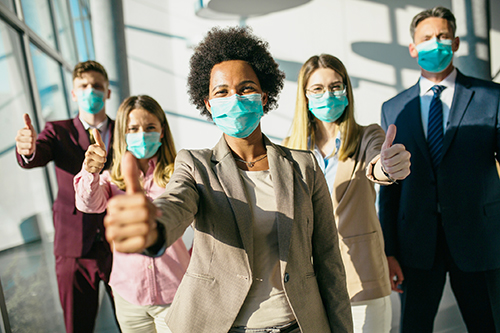
One of the pressing questions in the scientific community today is how long currently available vaccines for the SARS-CoV-2 virus will offer protection. To gain insight into this issue, AACC has launched the COVID-19 Immunity Study, an effort to examine immune responses to the vaccines and/or prior infection in a large group of volunteers diverse in age, sex, race, ethnicity, vaccine regimens, and geography. Conference attendees can donate a blood sample right here in Atlanta, inside the AACC Clinical Lab Expo at Exhibit Hall C.
The study proposes to investigate T cell immunity in response to different approved SARS-CoV-2 vaccines, or in response to the infection itself, said Victoria Zhang, PhD, MBA, chair of the study’s scientific committee. It also will evaluate the various antibodies such as anti-N, anti-S, and neutralizing antibodies profiles from individuals who received different kinds of vaccines, Zhang said, who is vice chair for clinical enterprise strategy and director of clinical chemistry for the University of Rochester Medical Center, in New York.
“There have been many ongoing studies related to SARS-CoV-2 and antibodies,” Zhang said. “Our study hopes to determine antibody levels and also T cell immunity for individuals in a diverse population in age, sex, race, ethnicity as well as vaccine regimens.”
The recent surge of the Delta variant has once again drawn people’s attention to vaccines, she said, “so we’re all trying to understand what’s going on. Unfortunately, at this moment, we just don’t have long enough data history to show the long-term impact of vaccines. We hope this study will provide us with a snapshot to study.”
Investigators will collect blood samples from attendees of the 2021 AACC Annual Scientific Meeting & Clinical Lab Expo who wish to volunteer. Study participants may be with or without a prior history of COVID-19 infection. Participants will be asked to agree to follow-up communications with study personnel and possible additional sample collections. Investigators hope to enroll up to 1,000 participants.
In return for donating blood, study participants will receive results of their antibody test results after all collected samples have been analyzed. Volunteers can complete a health questionnaire and start the consent process online to save time onsite. All blood donors will be entered into a drawing for one of two complimentary registrations to the 2022 Annual Scientific Meeting.
Even people who can’t attend the meeting can contribute to the study by submitting answers to a COVID-19 health questionnaire, Zhang said. For more information or to enroll, see www.myadlm.org/science-and-research/covid-19-resources/covid19-immunity-study.
AACC has been on the frontline of the pandemic, Zhang said. It previously formed a COVID-19 task force in spring 2020 to tackle questions on the utilities of serology testing, releasing practical recommendations for implementing and interpreting evolving SARS-CoV-2 emergency use authorization and laboratory-developed test serologic testing. The recommendations were published in Clinical Chemistry, with a longer, more in-depth version available on www.myadlm.org.
Then, AACC tapped experts to begin talking about what other kinds of studies could be done in conjunction with the AACC Annual Scientific Meeting. The approach for the study, which received Institutional Review Board approval, is modeled after AACC’s Universal Sample Bank program, which used samples from attendees of the 2015 Annual Scientific Meeting in support of research related to high-sensitivity cardiac troponin, a protein used in the diagnosis of heart attack and acute coronary syndrome.
The COVID-19 Immunity Study is unique in that it aims to enroll a large, diverse population and has comprehensive questionnaires to ask about participants’ overall health and COVID-19 histories, according to Zhang. “This will hopefully give us subgroups or brackets we can evaluate,” she said. Investigators also have been working with different vendors and the laboratory medicine community to evaluate testing platforms and antibodies, including anti-N, anti-S, and neutralizing antibodies.
Anything learned about the duration of the different vaccines could potentially help improve patient care by providing insights into the antibody response, T cell immunity, and how people react to the different vaccines, Zhang said. This could, in turn, provide guidance for what to do with patients, whether serology testing should be performed, and if so, how and when. Results also should provide some insight into the performance of different assays, to help laboratorians with day-to-day interpretation and consultation with clinicians.
Investigators did a lot of planning for sample stability, to make sure to freeze samples as soon as possible, and shipped to labs for analysis expeditiously, Zhang noted.
While Zhang said she often enters research studies with a working hypothesis, this time she prefers to stay open-minded, “because there’s still so much we really don’t know about this virus.” Results should be available within a couple of months following the meeting and will be submitted for publication, she said. Investigators also hope to compile leftover samples into a biobank available as a community resource for additional research.
With the research protocol in place, Zhang said, the team could conduct a repeat study in 2022. Ideally, she said, participants who donate samples for the 2021 study will agree to do so again next year to begin a more longitudinal study.
“I’m extremely excited about this study,” Zhang said. “I think we’re watching history in the making. It is up to us to be part of this. I hope many people will participate this study, either in person or through the online questionnaire, to help us and our community unfold the mysteries of this novel virus.”
To donate a blood sample, stop by Exhibit Hall C (in B/C Hall Connector) in the Georgia World Congress Center. Hours are 8:00 a.m.-6:00 p.m. on September 28 and 29, and 8:00 a.m.-1:00 p.m. on September 30.